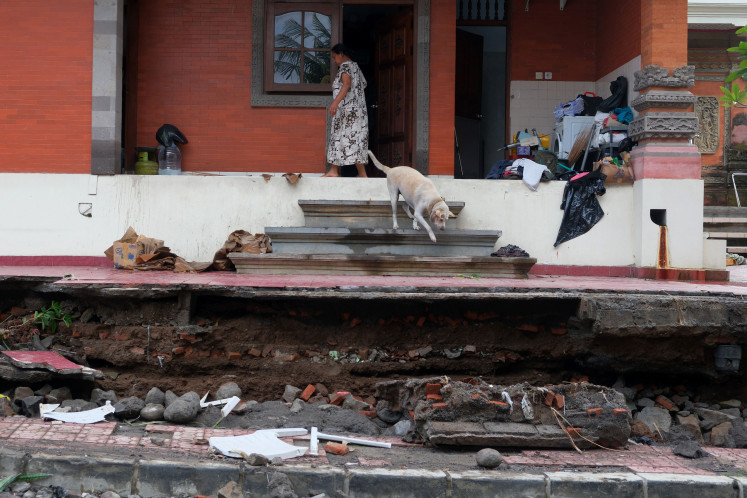Popular Reads
Top Results
Can't find what you're looking for?
View all search resultsPopular Reads
Top Results
Can't find what you're looking for?
View all search resultsYour letters: Confusion over foreign ownership of property
Thereâs still confusion over whether a foreigner can or canât own land in Indonesia
Change text size
Gift Premium Articles
to Anyone
T
here's still confusion over whether a foreigner can or can't own land in Indonesia. Allow me to explain, again, based on personal experience as both a foreigner and a wannabe foreign real estate developer here. The test of whether you really own a piece of real estate/land/property (let's call it an asset) is quite simple. Can you go to a bank and get a loan by pledging that asset as security/collateral? If you can't then you don't truly own it and that's why the bank can't have it.
Pak Setya, an Indonesian, for instance, can quite easily buy any real estate/land/property in the US, Great Britain, Australia, New Zealand, Singapore, Malaysia and many other countries if the existing owner is willing to sell it, at a price Pak Setya is willing to pay.
In almost all cases to help his purchase, Pak Setya can and will get a loan (called a mortgage) from one of the country's banks for up to 90 percent of the asset's value. This is how many Indonesians buy and own such assets in those countries.
The tenure, the ownership duration, of the asset Pak Setya buys is exactly the same as that of the previous owner. It can't be any different. If the asset has been a freehold (a tenure in perpetuity) ' most likely ' under a previous owner, it shall be a freehold too under Pak Setya. Pak Setya needs not be a resident in that country to buy the asset there. He can be an absentee owner for as long as he wants ' in fact many if not most properties in Belgravia, that most expensive part of London, belong to absentee foreign owners.
Now, compare and contrast the above, point by point, with the scenario in Indonesia: No mortgage, no bank loans to buy real estate/land/property for foreigners. Period.
The Indonesian owner can own the asset in perpetuity but the most the foreign buyer will get is the leasehold over the asset for the next 30 years. That's all, period. The foreign buyer needs to be a resident in Indonesia during all those 30 years. Period.
The first holding is for 30 years, renewable for next 20 years, then a third and last renewal of 30 years ' maximum holding (not ownership) of 80 years. Assuming of course the foreigner is still alive by then. But even the regulation for the above has not been implemented on the ground.
Wandering Star
Jakarta
Well, it is a country that requires a creative mind. Instead of 'extending' a leasehold you also might choose to 'renew' it. That would mean that you always have 80 years ahead. It just comes down to clever paperwork and not just using the public notary.
Another question altogether, however, is if Indonesia will still exist in its current form in 2096.
A smart move in my opinion, for someone who wants to stay here forever (beyond 80 years) would be to set up a company that owns the lands and fully and legally controls it.
Devineasia
Jakarta
Foreigners can't own private land, except if they are retired, and there are limitations. There is a proposal to let foreigners who live here and are married to own different types of land, but it has yet to happen.
What is called a leasehold title is for private residential properties only and even Indonesians can't own commercial properties under leasehold anymore. Old ownerships still remain, but if sold, it will change. There are some local differences, but it will change.
Foreign companies owned by foreigners can own commercial properties. The building use permit (HGB) and commercial operation (HGU) have developed more and more as the old leasehold and continued extension are only denied if the state needs the land. The new expropriation law is a bit tougher than before so the government can take land for public use, like most governments in the rest of the world.
Investing in property in Indonesia is more speculation than anything else. If you have a good purpose, then it might be a good deal. Most speculators take 'virgin' land and turn it into commercial land and there you can make a lot of money. But you can also lose money. In Australia you have less risk, but less profit to make on increased value.
Indonesia doesn't need any land speculators, local or foreign. Indonesia needs viable businesses. Australian companies with good real estate businesses can make good money and they should if they feel they have something unique to sell.
Orang Biasa
Jakarta










